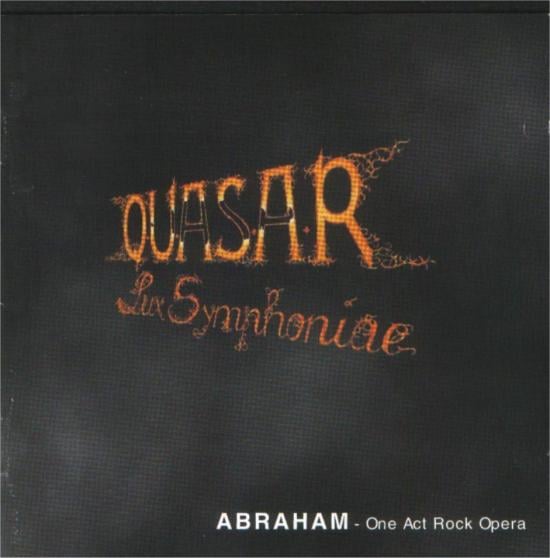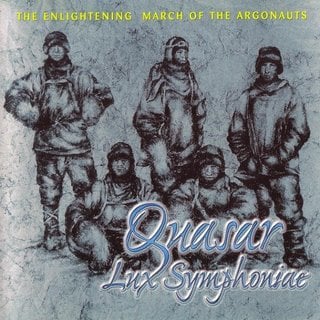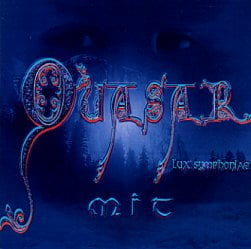Progarchives.com has always (since 2002) relied on banners ads to cover web hosting fees and all.
Please consider supporting us by giving monthly PayPal donations and help keep PA fast-loading and ad-free forever.
/PAlogo_v2.gif) |
|
Post Reply 
|
| Author | |
toroddfuglesteg 
Forum Senior Member 

Retired Joined: March 04 2008 Location: Retirement Home Status: Offline Points: 3658 |
 Topic: Quasar Lux Symphoniae (May 2010) Topic: Quasar Lux Symphoniae (May 2010)Posted: May 23 2010 at 06:39 |
|
Quasar
Lux Symphoniae or QLS as they prefer to be called now, was born in
1976 through the initiative of Roberto Sgorlon. He was later joined
by other members and the band released their debut album in 1977.
Five more albums followed. The last album, so far, was Synopsis in
2009.
QLS
does pretty inaccessible symphonic prog and they have been operating
under most progheads radars throughout their career. I think a band
like this deserve a bit more exposure so I contacted them with some
questions.
This
interview is a mix of a presentation of QLS past, the QLS albums, the
present and the future. So without any further time wasting, I give
you QLS. Paolo Paroni answered the questions. _________________________________
 Paolo Paroni Besides
of having to endure my questions, what are you up to these days?
Besides
making you wait a long time before receiving our answers, as band we
are basically still enjoying a period of rest after the release of
Synopsis,
our last album. The marketing and distribution procedures started a
bit later than expected, so we are just now starting to see the first
results of that huge effort which was composing, rehearsing and
recording Synopsis.
Anyway, in order to answer your question, I have to tell you that QLS
isn't a group which rehearses and meets on a regular basis: we
usually plan an intensive period of rehearsals just before a series
of engagements. So, after the official presentation of Synopsis
and a little series of live concerts, every member has continued his
musical life independently from the band. Some colleagues
occasionally – or regularly - play gigs with other groups and we
are currently weighing some live performance options, which is
something we do very seldom.
Over
to that past and “this is your life” bit of the interview. The
whole QLS biography can be found at
their homepage and I refer everyone to
this website for the bio.
But
why did you choose the name Quasar Lux Symphoniae and why did you
later shorten it to QLS?
The
original band's name was simply “Quasar”; and with that name the
group was active from the 70's to the early 90's. When we were about
to release our rock opera Abraham
and were starting to enjoy a little success, the British band
“Quasar” intimated us to change name, so we decided to add the
suffix “Lux Symphoniae”, which assured continuity and prevented
any unneeded legal troubles. As for the acronym QLS, it is just a
natural consequence of a very long and hard-to-type name. Anyway, we
never abandoned the full version of our name; we still use it
alternating that with the acronym, not much differently from what our
illustrious forefathers such ELP or Italian PFM did in the past.
Over
to your four albums.
 Your
debut album Abraham - One Act Rock Opera was pretty ambitious, to say
at least. A rock opera on a double CD. Please give us a presentation
of this album.
Actually
Abraham wasn't
QLS' debut album (sorry, my mistake - tf); we might rather consider it as the first work of a
new stylistic era, coinciding with many significant events such as a
new band's lineup, the first contract with an important producer, and
the wish to express ourselves on a more ambitious level, as you
rightly said. We all cherish Abraham
as our dearest “son”,
the one who made us known on a larger basis than we were, and made it
possible for us to express our ideal musical world. It was a great
challenge, musically and technically, but we were able overcome all
problems with the force of our musical convictions; like when we had
to combine a choir that was recorded in Italy with the other material
recorded in Germany. In the early 90's, with a limited budget, it
wasn't easy. But things like those taught us that every problem –
musical and technical – has a potential solution.  Your
second album The Enlightening March of the Argonauts was pretty
ambitious too. You are not in the business of making it easy for
yourselves. Please give us a presentation of this album.
A lot
can be said about The
Enlightening March of the Argonauts.
Some love it as much as they love Abraham;
while some consider it a weak work. I'll tell you some anecdotes
before revealing my personal opinion. The contract with our producer
was about to expire and we had to release this album within a given
date. Of course, we were late. So late that Roberto and I decided to
compose the songs independently, with me working on four songs and he
on two. After having written the pieces, we realized we were very
behind and had to start recording without a single rehearsal. The
time was so limited that all the colleagues had to play independently
without knowing what the final outcome would sound like; they simply
had to trust me conducting and explaining the musical phrases to
them. With the final touch being a bad recording engineer, we
couldn't expect the results to be much better than they were. But if
you approach the album with an open mind, you can find yourself
easily surprised, as we were the first time we rehearsed and
performed it live.
 I
would not call your third album Mit unambitious too. This is another
big album. Please give us a presentation of this album.
MIT
isn't a genuine QLS' work,
as it originated from an idea of Fabio Giacomello, our acoustic
guitarist. He wrote down a subject, composed some tunes, and asked
for our help to arrange them and to write some additional pieces. In
the end QLS' contribution was deep enough to release the album with
our name, even if we still consider it Fabio's work, written and
performed together with QLS.
 Your
fourth album Synopsis is not easy accessible too. This is yet another
big album. Please give us a presentation of this album.
Synopsis
is an homage to QLS'
various periods of composition styles, conceived as a celebration for
the band's 30th
anniversary. Four pieces in this album directly draw on styles which
inspired QLS during their musical life: Oblivion
is
a tribute to the psychedelic period, Snake
Dream pays
homage to the band's hard rock period, Moses
is
a short Opera which calls back to Abraham,
Flighting
Thoughts provides
acoustic guitar in the foreground, recalling MIT.
Arcano
and
Islemind
display
a very pronounced melodic vein, while Rhapsody
and Fugue
is an homage to our classical music background, which is our
strongest inspiration.
The
album Synopsis
is the result of a very long and detailed procedure. In over two
years of work we had the time and opportunity to let every piece
mature, grow, even change personality in some cases. It's a luxury to
have the chance to change something on a piece you've written months
before, realizing that it has continued to grow and mature inside of
you for all that time. We gradually added many details, but also
pruned a lot. In the end, we trashed enough good material for at
least another full album.
Please
tell us more about the artworks for every albums you have done.
We never
entered much into the graphic art process of the albums. We found the
right person for the artwork of the CD next to be released and
usually gave carte blanche about the graphic appearance. Synopsis,
though, has for sure the most painstaking booklet and covers of our
story, including detailed information about the genesis of the work
and the musical instruments used for the recording; besides usual
contents such as the lyrics and other general information.
What
is the creative processes behind your albums?
In the
past Roberto Sgorlon and I used to write our pieces pretty much
independently. When we worked together, the typical scenario was me
sitting at the piano, Roberto at my side, acting as my “outer ear”,
mostly asking me to save ideas I would have rather trashed.
On the
contrary, with Synopsis we
worked together on a very regular basis, meeting every week for long
periods of time working on every single aspect of our music before
starting rehearsals with the rest of the band. Technically, we worked
in Cubase, playing and recording a draft version (but a very accurate
one) of our music with virtual instruments, which could give all band
members a very detailed idea about the results we wanted to obtain.
Roberto's
role has been absolutely crucial; representing at the same time an
ideal, critical audience, a guide through the past styles of QLS
history, my first collaborator to exchange opinions with, and a
beautiful mind giving me stimuli about new possible ideas. Roberto
also had an active part in the creative process too; such as the
beautiful theme in Arcano;
and the introduction in Oblivion
wouldn't sound as it does without his cooperation. Even the parts
which I composed entirely on my own, such as the baroque Fugue in
Rhapsody and Fugue
or the Bach-style Toccata which serves as introduction to Snake
Dream wouldn't exist if
Roberto had not persisted in asking me to write something so unusual
for a rock band.
Which
bands would you compare QLS with and how do you describe your music?
Sorry to
partially elude your question, but I won't compare QLS with any other
band. For a series of reasons, including my deep ignorance about the
current musical scene, and the fact that my only sincere inspiration
is classical music. The other music that could have played a small
role in QLS' history (for example, ELP, the early Genesis, Rick
Wakeman) would have been just a partial inspiration from the timbric
point of view.
How
would I describe our music? Hard to say. I have an allergy for
genres, sub-genres and such, and enjoy the fact that QLS' music
hardly fits in any genre description. Sometimes I have declared that
what we make is “classical music played with rock instruments”,
even if that is only a partial description of our style. Whatever
everyone says, I like to think that the genre we belong to is... the
QLS genre. The
founding father of QLS, Roberto Sgorlon, left the band in 2007. But
he is still listed as a composer on Synopsis. What is QLS
relationship with Roberto Sgorlon?
I think
I have already described Roberto's musical role, but I should add
that he is also the producer of our last work Synopsis;
and from the sentimental point of view he will always represent a
friend, a colleague, and the father of this wonderful band.
Who
is the current members of QLS?
The
instrumental new entries are the guitarists: Elvio Tavian took
Roberto's place on lead guitar, together with Marco Filippo on rhythm
guitar. All the other members are QLS history: Fabio Giacomello on
the acoustic guitar, Marco Chiapolino on the bass guitar; Fabrizio
Morassutto is our rhythmical engine as the drummer, and on keyboards
at my side sits Ulisse Tonon. The male voice is Luca Vigneri's, who
perfectly matches his female counterpart, Annalisa Malvasio, with QLS
since Abraham.
The
Abraham Rock Opera was based on a piece from the Bible. Is QLS a
Christian band or do you regard yourself as a secular band?
Absolutely
secular.
How
is your record label situation and the distribution of your albums?
What is your experiences with the music/record industry?
Honestly,
in the past we never cared much about the distribution of our work.
For Synopsis,
though, we are trying to put more attention on this aspect and the
internet is helping us stay as close as possible to our fans.
You
are only seldom doing gigs. Please tell us more about the situation
regarding gigs.
That was
a choice. We decided to perform only in ideal situations when our
requirements could be met, deciding for quality versus quantity. Some
laziness played a role too, to be honest, making us miss nice
opportunities to perform live. We are working on this aspect too,
right now planning a possible tour and taking offers for concerts.
I
guess music does not fill every hour of your life. What else are you
up to?
For some
of us music is what we live on. Marco Filippo plays guitar for a
living (and just graduated from the Conservatory in singing),
Annalisa Malvasio is a professional opera singer and I am a
conductor. The other band members are lucky enough not to be
professional musicians.
What
is QLS plans for this year and in the future?
Definitely
promoting Synopsis, perform live and... not waiting ten years this
time before releasing our next work.
Anything
you want to add to this interview?
My
apologies for the late answer and my heartfelt thanks, from all QLS,
for your time and attention.
Thank you to Paolo for this interview. |
|
 |
|
andrea 
Prog Reviewer 

Joined: May 20 2005 Location: Italy Status: Offline Points: 2064 |
 Posted: May 23 2010 at 14:53 Posted: May 23 2010 at 14:53 |
|
Thank you for the interview!
By the way, I here you can find some videos featuring Mestro Paroni as a conductor...
...and a video interview with Quasar Lux Symphoniae with English subtitles!
|
|
 |
|
memowakeman 
Special Collaborator 

Honorary Collaborator Joined: May 19 2005 Location: Mexico City Status: Offline Points: 13032 |
 Posted: May 26 2010 at 17:11 Posted: May 26 2010 at 17:11 |
|
What a nice and informative interview, Synopsis seems to be an interesting album.
|
|
|
Follow me on twitter @memowakeman |
|
 |
|
Post Reply 
|
|
| Forum Jump | Forum Permissions  You cannot post new topics in this forum You cannot reply to topics in this forum You cannot delete your posts in this forum You cannot edit your posts in this forum You cannot create polls in this forum You cannot vote in polls in this forum |